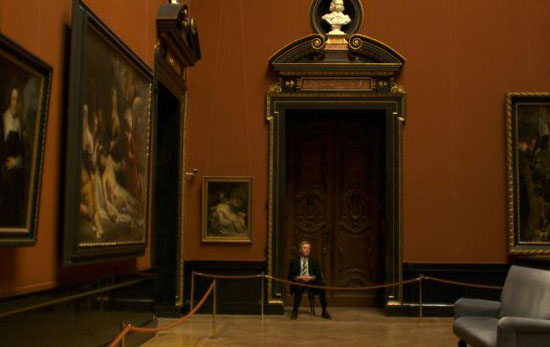 Back to selection
Back to selection
Locarno Critic’s Notebook #3

Leviathan. You may have heard the title by now. By the time it screened to press, the film had already gained some momentous hype, and I’m pleased to report it does not disappoint. Often exhilarating, Véréna Peraval and Lucien Castaing-Taylor‘s creation is a unique viewing experience—loud, disorienting, frightening, exciting and visually awesome. The best film from the main competition, at the very least, Leviathan (above) offers the sort of sensory adventure that cinema can but rarely does offer. Using cheap GoPro digital cameras, the filmmakers show us images and perspectives we’ve never seen before. Apparently, Apichatpong Weerasethakul did not like the film for having been unable to sense the presence of the directors within the film, which is valid, but for me an interesting part of this often alien encounter. For many critics, this was the movie to root for on the night of the awards ceremony, but in a surprising decision the Golden Leopard was awarded to Jean-Claude Brisseau’s The Girl From Nowhere, a low budget departure from his usually aesthetically refined melodramas. It’s a good film, but if it’s a great one worthy of Locarno’s top prize, I’ll have to return to it for a reevaluation. When Night Falls, which I wrote about in the last entry, was also treated well on closing night. Ying Liang won the best director prize, and An Nai won best actress. The prizes, however, should not be an aspect of a film festival that gets more attention than the diverse range of programming. I’ll refrain from expounding on any more details. If you wish to know more about all the winners, visit the official website.
Retrospective viewings continue to provide some of the best options here in Locarno. One of the programs of the festival is to show a film from each member of the juries, and in the case of Alex Ross Perry, part of the Concorso Cineasti del presente, his film The Color Wheel was part of the competition here last year so this time he opted to share his first film, Impolex (2009). I had been eagerly awaiting a chance to see this commercially unavailable film for quite some time (since seeing this ages ago). Even better than I had anticipated, Impolex comes from the same comical sensibility as The Color Wheel. The film is less sophisticated, but doesn’t suffer from this naïveté, instead making for a welcomingly bizarre experience that seems entirely guided by instinct. The right visual choices are made at every step. Close-ups are sparingly used, making a key monologue late in the film more emotionally impactful than one would expect amongst such absurdity. Perry’s comedy is inseparable from form. It’s in the compositions, the distance between characters, between them and the camera, and the editing choices that dictate most of the laughter. Though at the screening, few were laughing along with me. Perhaps there’s something at the core of Impolex that’s too alienating to allow most the comfort to relax, but it’s in the film’s distanciation and formal oddness, that it succeeds at every level for viewers more eager to be uncomfortable.
One of the more interesting relationships I’ve had with a film at this year’s festival is NYC-based artist Jem Cohen’s Museum Hours, a film that I initially found to be the all-too-backhanded adjective of “fine”, but as the film moves along its careful pace, it resonates more and more. Now, days later, it’s one of the films most prominent in my memory. Its insights, emotions, and perhaps most of all its gentleness keep occurring to me in pleasant passing thoughts. The film is a progressive discovery of details, a testament to infinite value of great works of art, and the consolation of expression, be it in the form of a painting, or reaching out to a stranger.

There is a lineage in Canadian cinema of inadequate, impotent, awkward, failure male protagonists and Kazik Radwanski’s Tower is a modest but arresting work within this tradition. Whether the filmmakers are entirely aware of this trope and playing with it I know not, but it feels like an attempt to streamline this arc, hone in on its bare necessities: impotency, irresponsibility, ultimate failure, and to update it with 21st century sources of alienation like iPhones and Facebook, all of which only work to perpetuate the main character’s utter complacency.
I largely neglected the Otto Preminger retrospective, something I regretted even as I made the choice to do so in order to focus on my other writing assignments. However, towards the end of the festival I was able to catch Angel Face, the one film I was advised that I had to see. It was a masterpiece, of course—a necessary dose of perfect cinema to put the rest of the festival into context. If Locarno is the best festival at doing something, certainly it is mixing the old and the new, blurring the distinctions usually applied to these films, offering classic films a stage on which to be reborn, and offering new films a chance to become classics alongside them. As I sat in the Cinema Rex—Locarno’s best indoor venue, arguably, with its white leather seats and cool air conditioning—and took in Preminger’s masterful compositions, one brilliant choice after another, all of a sudden I could hear something beyond the walls of the theater. I realized it was the notoriously loud volume—known for keeping nearby residents and visitors awake at night—coming from the Piazza Grande. It took me but a moment to recognize the sounds of engines revving in Soi Cheang’s Motorway, a very good film which I had seen a couple of nights prior. It may sound like this distraction could have ruined the Preminger screening, but I sat back and smiled as the holy motors of new cinema gave life to the old.

